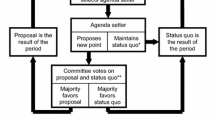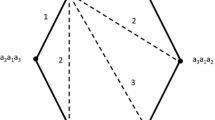Abstract
Much work in the field spatial models has concerned the conditions under which majority rule is stable in a multi-dimensional policy space. Some have suggested that legislative practices such as germaneness rules (Shepsle, 1979; Denzau and Mackay, 1981, 1983; Krehbiel, 1987) and different types of agendas (Shepsle and Weingast, 1984; Banks, 1985; McKelvey, 1986) either induce stability or limit the set of possible outcomes. However, they do not consider how stable the choice of these rules may be. This paper shows how the choice of germaneness rules inherits the instability of the policy space. While the use of any particular germaneness rule limits the set of possible outcomes (Feld and Grofman, 1988), it is shown that the process of choosing these rules is unstable.
Similar content being viewed by others
References
Bach, S. (1987).The nature of congressional rules. Paper presented at annual meeting of the American Political Science Association, Chicago.
Banks, J.S. (1985). Sophisticated voting outcomes and agenda control.Social Choice and Welfare 1: 295–306.
Black, D. and Newing, R.A. (1951).Committee decisions with complementary valuation. London: William Hodge and Company Limited.
Cox, G. (1987). The uncovered set and the core.American Journal of Political Science 31: 408–000.
Denzau, A.T. and Mackay, R.J. (1981). Structure-induced equilibria and perfect-foresight expectations.American Journal of Political Science 25: 762–779.
Denzau, A.T. and Mackay R.J. (1983). Gatekeeping and monopoly power of committees: An analysis of sincere and sophisticated behavior.American Journal of Political Science 27: 740–761.
Enelow, J.E. and Hinich, M.J. (1983). On Plott's pairwise symmetry condition for majority rule equilibrium.Public Choice 40: 317–322.
Feld, S.L. and Grofman, B. (1988). Majority rule outcomes and the structure of debate in one-essue-at-a-time decision-making.Public Choice 59: 239–252.
Fink, E.C. (1987).Political rhetoric and strategic choice in the ratification conventions on the U.S. Constitution. Ph.D. dissertation, University of Rochester, Rochester, NY.
Fink, E.C. (1990).Advocacy, Risk aversion, and institutional investment. Paper presented at the Fifth International Conference on the Foundation and Applications of Utility, Risk, and Decision Theories, Duke University.
Humes, B.D. (1988).Essays on institutional change: The choice and effects of legislative rules. Ph.D. dissertation, Washington University in St. Louis.
Krehbiel, K. (1987). Sophisticated committees and structure-induced equilibria in Congress. In M.D. McCubbins and T. Sullivan (Eds.),Congress: Structure and policy. New York: Cambridge University Press.
McKelvey, R.D. (1976). Intransitivities in multidimensional voting models and some implications for agenda control.Journal of Economic Theory 12: 472–482.
McKelvey, R.D. (1979). General conditions for global intransitivities in formal voting models.Econometrica 47: 1085–1111.
McKelvey, R.D. (1986). Covering, dominance, and institution free properties of social choice.American Journal of Political Science 30: 283–314.
Oleszek, W.J. (1984).Congressional procedures and the policy process, 2nd ed. Washington, DC: CQ Press.
Ordeshook, P.C. and Schwartz, T. (1987). Agendas and the control of political outcomes.American Political Science Review 81: 179–200.
Ostrom, E. (1986). An agenda for the study of institutions.Public Choice 48: 3–25.
Plott, C.R. (1967). A notion of equilibrium and its possibility under majority rule.American Economic Review 57: 787–806.
Riker, W.H. (1980). Implications from the disequilibrium of majority rule for the study of institutions.American Political Science Review 74: 432–446.
Schofield, N.J. (1978). Instability of dynamic games.Review of Economic Studies 45: 575–594.
Schofield, N.J. (1985).Social choice and democracy. New York: Springer-Verlag.
Shepsle, K.A. (1979). Institutional arrangements and equilibrium in multidimensional voting models.American Journal of Political Science 23: 27–60.
Shepsle, K.A. (1983). Institutional equilibrium and equilibrium institutions. In H.F. Weisberg (Ed.),Political science: The science of politics. New York: Agathon Press.
Shepsle, K.A. and Weingast, B.R. (1984). Uncovered sets and sophisticated voting outcomes with implications for agenda control.American Journal of Political Science 28: 49–74.
Tullock, G. (1967). The general irrelevance of the general impossibility theorem.Quarterly Journal of Economics 81: 256–270.
Wilson, R.K. and Herzberg, R. (1988).Effects of agenda access cost in a spatial committee setting. Social Science Working Papers No. 6 School of Social Sciences. Rice University.
Author information
Authors and Affiliations
Additional information
I am grateful to Randall Calvert, Arthur Denzau, Evelyn Fink, Thomas Hammond, Kenneth Shepsle, Albert Van Cleef, Rick Wilson, and three anonymous reviewers for theiry very helpful comments. I would also like to thank the Center for Political Economy at Washington University in St. Louis which provided partial support for this project.
Rights and permissions
About this article
Cite this article
Humes, B.D. Majority rule outcomes and the choice of germaneness rules. Public Choice 75, 301–316 (1993). https://doi.org/10.1007/BF01053441
Accepted:
Issue Date:
DOI: https://doi.org/10.1007/BF01053441




